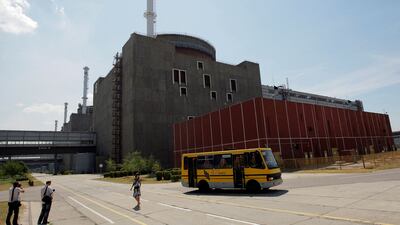An energy expert has issued a clarion call for Russia to allow independent inspectors into Ukrainian nuclear sites amid fears of another disaster.
President Vladimir Putin’s forces seized control of the Chernobyl power station on February 24, hours after the full-scale invasion of Ukraine was launched, and on March 4 troops took control of a power plant in Zaporizhzhia – the largest nuclear site in Europe.
Dr Aura Sabadus, a Ukrainian energy market specialist at the Independent Chemical and Energy Market Intelligence (ICIS) data provider, has warned about the continued risks of the sites remaining under the control of the invading forces.
Chernobyl, the site of the 1986 nuclear disaster, is not an active plant but holds radioactive waste from the accident.

Zaporizhzhia has capacity of 5.7 gigawatts, enough to power more than four million homes.
“Hopefully some kind of sense will prevail and they will not damage the plants because ultimately if reactors are damaged any radioactivity will not just impact Europe and Ukraine but also Russia itself. But it’s certainly sending a very scary message to everyone,” Ms Sabadus told reporters at a London briefing.
“The biggest concern right now is that the [Zaporizhzhia] plant is under Russian control but the Russian troops have cut communications with the Ukrainian authorities, and there is no internet connection and no mobile connection with the power plant.”
And referring to the captured Chernobyl site, she said “anything can happen because there is no connection with the authorities and [the Russians] can do anything at all.”
“The bottom line is it’s very vulnerable and unless some protective measures are taken, to allow inspections from the IAEA or from the UN. I think the situation remains precarious, unless we have these international inspections.”
The International Atomic Energy Agency has raised concerns about staff at Chernobyl not being rotated since February 23 – the eve of the Russian attack.
Ms Sabadus said it is “absolutely critical” that workers in charge of the plant are given a break so that they are capable of carrying out their work effectively.
She also expressed grave concerns about Russia’s attack on a nuclear research facility near the eastern Ukrainian city of Kharkiv this week.
The Kharkiv Institute of Physics and Technology houses a nuclear research facility called Neutron Source. Some 37 fuel cells are understood to be located in its active zone.
Russian soldiers fired rockets at the site on Sunday, the Ukrainian national security service said.
“The radioactivity there is sub-critical, there are no problems as of now, but it is incredibly concerning that Russia is hitting these nuclear power plants and they were also hitting oil depots, so clearly a huge pollution problem,” Ms Sabadus said.
She suggested one reason why the Russians made a beeline for nuclear sites after crossing the border into Ukraine could be because Moscow plans to “blackmail the international community” with its newfound power over Ukrainian energy.
She said the coming days would be “critical” due to an expected cold weather front and Russia’s threat to cut gas supplies to Europe. President Putin may choose to grind Nord Stream 1 to a halt or opt for a more drastic measure by stopping the flow of gas across all pipelines.
The analyst said eastern European countries would be more heavily affected in such a scenario, as they are more reliant on Russian gas than nations in the west of the continent. “We have daily discussions with all the authorities, the whole industry is preparing, co-ordinating [for the possible cut]. We work with some scenarios but ultimately it’s a very unpredictable situation so we don’t know what could happen and where things could go horribly wrong, if they do indeed [cut the gas].”



















































